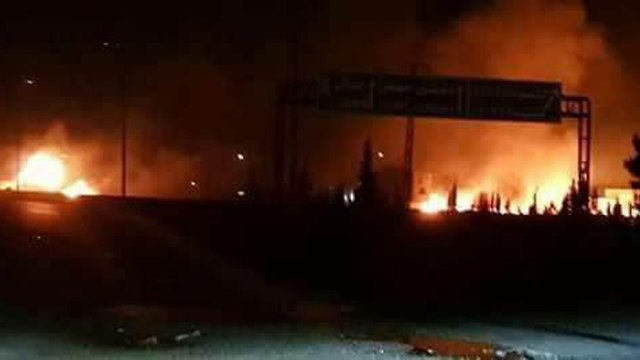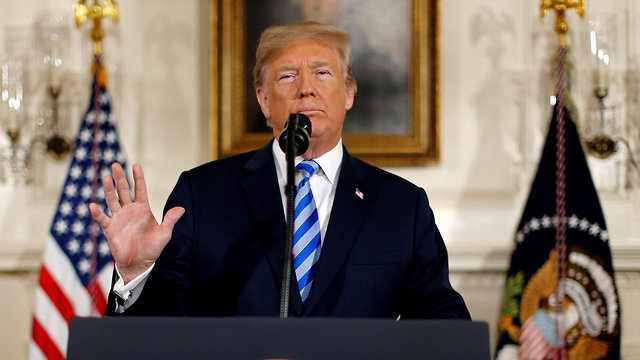Analysis: Even if Iran had no intention of launching missiles at Israel on Tuesday, the alleged Israeli strike came along and conveyed the following message to the Iranians: You raised the likelihood of an attack on Israel, so we’re raising the threat level, despite the tensions.
Shortly after US President Donald Trump’s declaration, explosions were reported by Syrian sources in the area of Damascus, with Arab media outlets pointing a finger at Israel.
If Israel indeed carried out the attack, it means it didn’t wait a single moment for the Iranians to prepare some kind of hostile activity against Israel. Regardless of whether the bombed target was directly related to the Iranian preparations for a retaliatory attack against Israel or just a “regular” target that crossed one of Israel’s red lines in Syria, this is what we call a preemptive strike.
Even if Iran had no intention of launching missiles at Israel on Tuesday, the alleged Israeli strike came along and conveyed the following message to the Iranians: You raised the likelihood of an attack on Israel, so we’re raising the threat level, despite the tensions.

Now, we’re waiting to see what the Iranians will do: Will they continue the preparations for an attack, will they respond, or will they postpone their plans? The defense establishment is preparing for the response taking shape in the Iranian mind.
Senior Israeli defense officials have reached the conclusion that Trump’s statement will have little influence, if any, on the attack being planned by the Iranians on the northern border. What happens in the north is reality, and what happens in the Oval Office is theater. President Trump is addicted to the drama itself. He isn’t very interested in what happens after the show, which is why we have no idea which sanctions he plans to renew.
Shortly before Trump’s speech, the political echelon instructed the IDF to open bomb shelters in the Golan Heights. Intelligence information received by the defense establishment on Tuesday apparently pointed to possible changes in the movements of Iranian missile units in countries with a potential for firing missiles into Israel.
By opening bomb shelters in the Golan Heights, Israel signaled to the Iranians that it is preparing for a major attack in Syria. The army actually tried to ease the public’s anxiety on Tuesday by explaining that an Iranian retaliatory attack won’t necessarily lead to a comprehensive conflict and that a lot depends on the extent of the damage. But the public received a double message: The decision to call off the chief of staff’s address at the Herzliya Conference and the order to ready bomb shelters was seen by the public as a sign marking the beginning of a military move, and it likely wasn’t wrong.
The IDF has been on a high state of alert for more than a week now in light of a concrete warning of an Iranian attack through a proxy. This warning has created a heightened state of alert in the intelligence area, which also included reserve call-ups, and put the air defense system—from the Arrow to the Patriot missile—on a particularly high state of alert. It’s unclear whether the Iranian movements detected in the past 24 hours were sped up ahead of Trump’s declaration as an Iranian defiance of the US, or whether the Iranians were operationally prepared to carry out an attack.

The Iranians were likely unimpressed by the Israeli reports which revealed, in an intentional and unprecedented manner, sensitive intelligence information pointing to a concrete Iranian plan to launch missiles at military facilities in Israel. They are conveying the following message: You may know what we’re planning, but it won’t deter us and we’ll settle the score with you. And they know what they’re talking about. If the Iranians are indeed planning to launch missiles, it won’t be so simple to locate the launchers and hit them.
It’s unlikely that the security officials surrounding the American president, like Secretary of Defense James Mattis, will recommend attacks on Iran’s nuclear facilities. So if anyone in Israel is hoping that the US will attack Fordo or declare war on Iran, because Iranian missiles were launched at a military camp in Israel from Syria, they should just forget about it. We are all alone in the northern crisis, all the answers are exclusively ours, and we are fully responsible for them.
The US withdrawal from the nuclear agreement doesn’t improve Israel’s strategic situation. The IDF, as of Tuesday, is stretching itself to the max: From Gaza, through a new front in Syria against Iran to an old-new front called the Iranian nuclear facilities. The current government has a golden share in opening the two fronts against Iran.
Even if Iran doesn’t start enriching uranium tomorrow morning, it no longer feels committed to the agreement as it was signed: Neither to its dates nor to the restrictions it imposes. It will violate the agreement whenever it feels it can.
If Israel had any control, or at least cooperation with the major powers in supervising the Iranian nuclear program, we lost it. So we shouldn’t rejoice this morning. The finance minister had better check the remaining reserves in the budget in order to quickly move them to the defense budget.
As reported by Ynetnews
